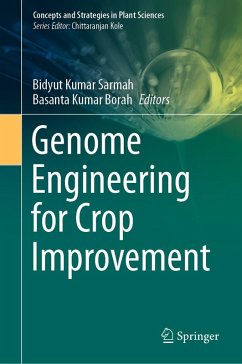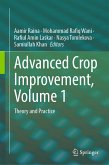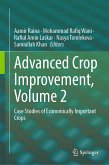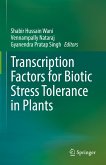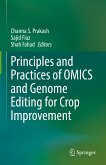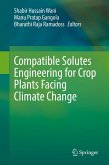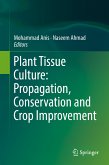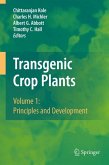This book serves the teachers, researchers and the students as a handy and concise reference as well as guidebook while designing and planning for use of the advanced technologies for crop improvement.
The content of the book is designed to cover the latest genome engineering techniques for crop improvement. The conventional breeding has got its limitations such as non-availability of desired genes within the genepool. In many cases, breeding has been highly used and it has nearly reached its highest limit so far as the productivity and production of crops are concerned. However, with increasing need of food and decreasing resources, including water, land, labour, etc., to feed the growing population, the alternative available ways of increasing crop productivity need to be explored and exploited. Genome engineering has a wide scope that includes technologies such as genetic engineering and transgenesis, RNA technologies, CRISPR, cisgenics and subgenics for better productivityand more efficient biotic and abiotic stress management. Therefore, the book is planned to enlighten the readers with the advanced technologies with examples and case studies, whenever possible. Efforts will be made to emphasize on general efforts on various major food crops; however, it would also be made clear that such efforts could be taken as proofs of concepts and that this could be extrapolated keeping the demand in mind.
The content of the book is designed to cover the latest genome engineering techniques for crop improvement. The conventional breeding has got its limitations such as non-availability of desired genes within the genepool. In many cases, breeding has been highly used and it has nearly reached its highest limit so far as the productivity and production of crops are concerned. However, with increasing need of food and decreasing resources, including water, land, labour, etc., to feed the growing population, the alternative available ways of increasing crop productivity need to be explored and exploited. Genome engineering has a wide scope that includes technologies such as genetic engineering and transgenesis, RNA technologies, CRISPR, cisgenics and subgenics for better productivityand more efficient biotic and abiotic stress management. Therefore, the book is planned to enlighten the readers with the advanced technologies with examples and case studies, whenever possible. Efforts will be made to emphasize on general efforts on various major food crops; however, it would also be made clear that such efforts could be taken as proofs of concepts and that this could be extrapolated keeping the demand in mind.
Dieser Download kann aus rechtlichen Gründen nur mit Rechnungsadresse in A, B, BG, CY, CZ, D, DK, EW, E, FIN, F, GR, HR, H, IRL, I, LT, L, LR, M, NL, PL, P, R, S, SLO, SK ausgeliefert werden.
Es gelten unsere Allgemeinen Geschäftsbedingungen: www.buecher.de/agb
Impressum
www.buecher.de ist ein Internetauftritt der buecher.de internetstores GmbH
Geschäftsführung: Monica Sawhney | Roland Kölbl | Günter Hilger
Sitz der Gesellschaft: Batheyer Straße 115 - 117, 58099 Hagen
Postanschrift: Bürgermeister-Wegele-Str. 12, 86167 Augsburg
Amtsgericht Hagen HRB 13257
Steuernummer: 321/5800/1497
USt-IdNr: DE450055826
Bitte wählen Sie Ihr Anliegen aus.
Rechnungen
Retourenschein anfordern
Bestellstatus
Storno

